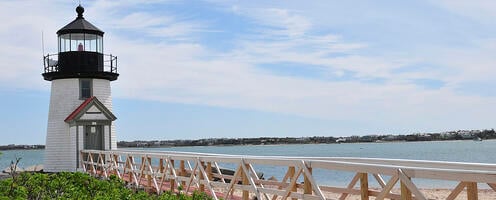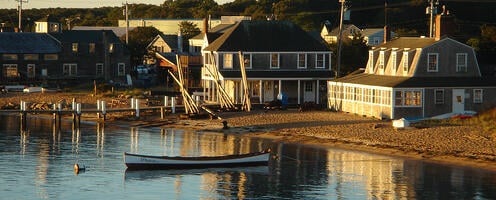The 2016 hurricane season saw its worst with Hurricane Matthew’s October devastation. This year we're barely into September and Texas is...
When Judy Rice and her husband were cruising the waters of Venezuela, fellow sailors warned them about piracy. They took extensive safety measures to prepare for potential threats. One night, when violent noises erupted outside their boat, their preparations were put to the test. Read on for a wild story!
This Boarding Story is Fishy!
By Judith Rice aboard S/V Thaleia
Cruising is not all fun and sun; sometimes it is a serious business. For example, on Thaleia, we take our safety seriously. After debating about the advisability of taking the boat to Venezuela where some cruisers have had piracy problems, we decided to go, but not before developing our plan for the worst possible scenario: being boarded by robbers.
Our weapons are pepper spray, flare guns, radio, and a steel billy club. We discussed our plan for responding to a boarding if one or both of us was below decks at an anchorage, and we had a plan of action if we were threatened with a boarding while underway. For the passage, we positioned our weapons in the cockpit; we each had a flare gun within easy reach, the pepper spray was in John's pouch and the hand-held VHF was in my pouch.
At dusk, we set sail from Trinidad for Los Testigos, a lovely, sparsely populated Venezuelan island, staying well off of the east coast of Venezuela, reputedly the most dangerous area. During the night, we kept careful watch for boats, and were greatly relieved to see none of the fishing pirogues that sometimes carry men with weapons and evil intentions. The passage was, as we had hoped it would be, uneventful.
)%20(84).png)
After an idyllic 2-day stay in Los Testigos, we sailed on to Juan Griego on Isla Margarita. We were delighted with the picturesque village and the lovely people in Juan Griego, but still we were mindful of the security measures that we needed to take. Every night, we brought our outboard engine on board or locked it to the dinghy, then chained and locked the dinghy (ragged though it is) to the boat. We took our flare guns and pepper spray below decks and put them in their positions on either side of the master berth, just in case. After the first few days, we hardly thought of security there; Juan Griego is a close-knit community of fishermen and their families and friends who regularly gather on the beach to celebrate and sell their catches. Otherwise, the anchorage is quiet and not heavily populated with cruising boats.
)%20(85).png)
On our fourth night in the Juan Griego anchorage, in one instant, everything changed. It was about 3:00 in the morning when I heard a loud crash into the side of our boat right next to our berth. Then I heard several smaller bumps against the boat. This is it, I thought.
Sitting straight up in bed, I put my hand on John's arm and whispered, "We've been boarded."
Quickly and without uttering a sound, John got out of bed, looking first out of the aft port, then toward the companionway. I handed him a flare gun and got out of bed. As if rehearsed, I moved to the nav station, picked up the mike and flipped on the VHF.
"Here's the pepper spray." I added, still whispering, and handed it to him.
With pepper spray in one hand and armed flare gun in the other, he began his ascent of the companionway ladder. I could feel my heart beating furiously in my throat, and my mouth was dry. "Be careful!" I whispered. He nodded.
John moved quickly and quietly up the ladder just far enough to survey the cockpit first, then the foredeck. Nothing. He looked to the port side where the commotion originated, and again, saw nothing. He walked the decks and inspected the bowsprit. No boats leaving the scene, no swimmer in the water, nothing. I joined him in the cockpit, and we sat for a while, looking out over a very still anchorage.
"I did hear something," I said, "and it was loud too."
"I believe you." John said, though I thought I heard some skepticism. We sat for 20 minutes, saying nothing and listening for any sound that would indicate another problem.
We heard only an occasional splash of a mullet. Nothing else. We went back to bed, but neither of us slept soundly. In the morning while I was making coffee, John climbed over the rigging to get into the dingy, again looking to see if anything was amiss. A few moments later, he came to the companionway and called to me.
"Judy," he called, "come here a minute. There's something you have to see." I joined him in the cockpit and he motioned me to look at what he had just seen.
There it was. The evidence. Our thief in the night. In our inflatable was a three-foot mullet, still holding on to life, weakly flapping its tail and looking to us for a rescue. This creature had jumped into the dinghy in the middle of the night, slamming the chain against the boat repeatedly while making a valiant effort to escape. I was vindicated!
)%20(81).png)
First, we had a good laugh, then fetched the camera to document the incredible catch. We considered releasing him, but were afraid that it was too late he was almost a goner. We discussed eating the mullet, fried, but neither of us was enthusiastic about cleaning or cooking it. When we saw a young man fishing a few hundred feet from us, the solution was obvious. John got into the dinghy and paddled over to the pirogue and offered the fisherman our offending mullet. He accepted with many smiles and muchas gracias, and we felt just slightly less guilty for all of the middle-of-the-night bad thoughts about the local fishermen.
Buen provecho!
Be the first to access boater stories like this one by subscribing to our new newsletters,The Running Fix and Dock Talk!
-1.png)






